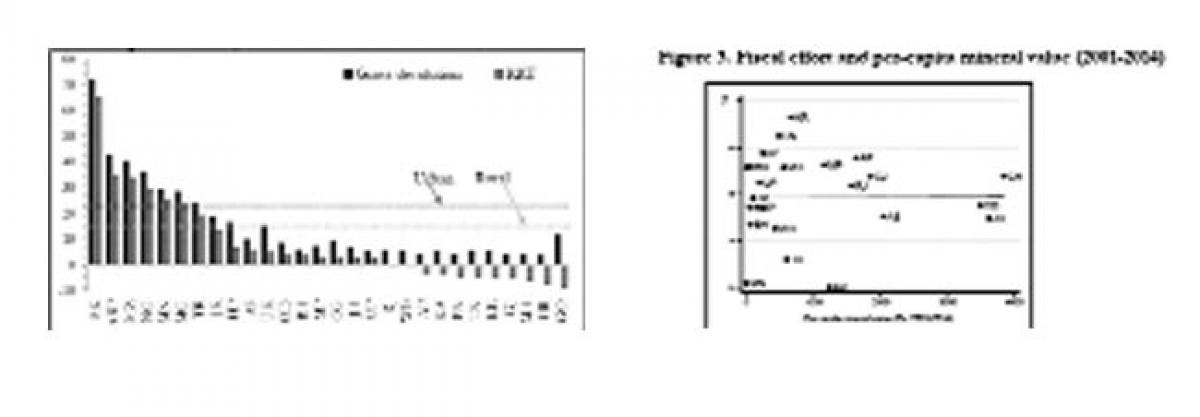Live
- Over 7,600 Syrians return from Turkiye in five days after Assad's downfall: minister
- Delhi BJP leaders stay overnight in 1,194 slum clusters
- Keerthy Suresh and Anthony Thattil Tie the Knot in a Christian Ceremony
- AAP, BJP making false promises to slum dwellers for votes: Delhi Congress
- 'Vere Level Office' Review: A Refreshing Take on Corporate Life with Humor and Heart
- Libya's oil company declares force majeure at key refinery following clashes
- Illegal Rohingyas: BJP seeks Assembly session to implement NRC in Delhi
- Philippines orders full evacuation amid possible volcanic re-eruption
- Government Prioritizes Welfare of the Poor, says Dola Sri Bala Veeranjaneyaswamy
- Two Russian oil tankers with 29 on board damaged due to bad weather
Just In
RRT should be significantly linked to fiscal and governance efforts on the part of the states


The Economic Survey examines whether the effects associated with the “aid curse” and the “natural resources curse” internationally are
The Economic Survey examines whether the effects associated with the “aid curse” and the “natural resources curse” internationally are discernible in the context of the Indian States. It calculates Redistributive Resource Transfers’ (RRT) from the Centre (between 1994 and 2015) and value of natural resources for Indian States (over 1980 and 2014) and correlates these with several economic outcomes and an index of governance
Redistributive Resource Transfer (RRT) to a state (from the Centre) is defined as gross devolution to the state adjusted for the respective state’s share in aggregate Gross Domestic Product (GDP). The top 10 recipients are: Sikkim, Arunachal Pradesh, Mizoram, Nagaland, Manipur, Meghalaya, Tripura, Jammu and Kashmir, Himachal Pradesh and Assam.
Figure 1: shows the ranking of States, in 2015, in the descending order of RRT received in per capita terms and also per-capita gross devolution. The yellow and green dotted lines in figure 1 show the all-India rural and urban annualised per-capita poverty lines for 2015 respectively. Annual per capita RRT flows for all north-eastern states (except Assam) and Jammu & Kashmir have exceeded the annual per-capita consumption expenditure that defines the all-India poverty lines, especially the rural line.
The Survey points out that there is no evidence of a positive relationship between these transfers and various economic outcomes, including per capita consumption, GSDP growth, development of manufacturing, own tax revenue effort, and institutional quality.
Instead, there is a suggestive evidence of a negative relationship. For example, larger RRT flows seem to negatively affect fiscal effort (defined as the share of own tax revenue to GSDP). These trends are robust to alternative definitions of RRT.
Also, whether mineral rich states like Jharkhand, Chhattisgarh, Odisha, Rajasthan and Gujarat ,are doing well on the metrics of economic outcomes and governance is considered in the context of redistributive transfers. However, this does not reveal conclusive results and there is no evidence of a negative relationship between fiscal effort and reliance on revenue from natural resources over the period 2001-14.
Thus, the existence of a ‘RRT curse’ and the lack thereof of a ‘natural resource curse’ in the context of Indian States implies that both the Centre and States need to act to mitigate the effects of the former and guard against the emergence, in future, of the latter. In this context, the question is whether RRT, in future, can be linked more saliently to fiscal and governance efforts on the part of the States.
The Economic Survey 2016-2017, also suggests providing a part of the RRTs or to redistribute the gains from resource use as a Universal Basic Income (UBI) directly to households in relevant states which receive large RRT flows and are more reliant on natural resource revenues.
Finally, recognising and responding creatively to possible pathologies created by large bounties-either in the form of redistributive resources or natural resources, will be important to avoid making the errors of history.
Source:pib.in

© 2024 Hyderabad Media House Limited/The Hans India. All rights reserved. Powered by hocalwire.com






